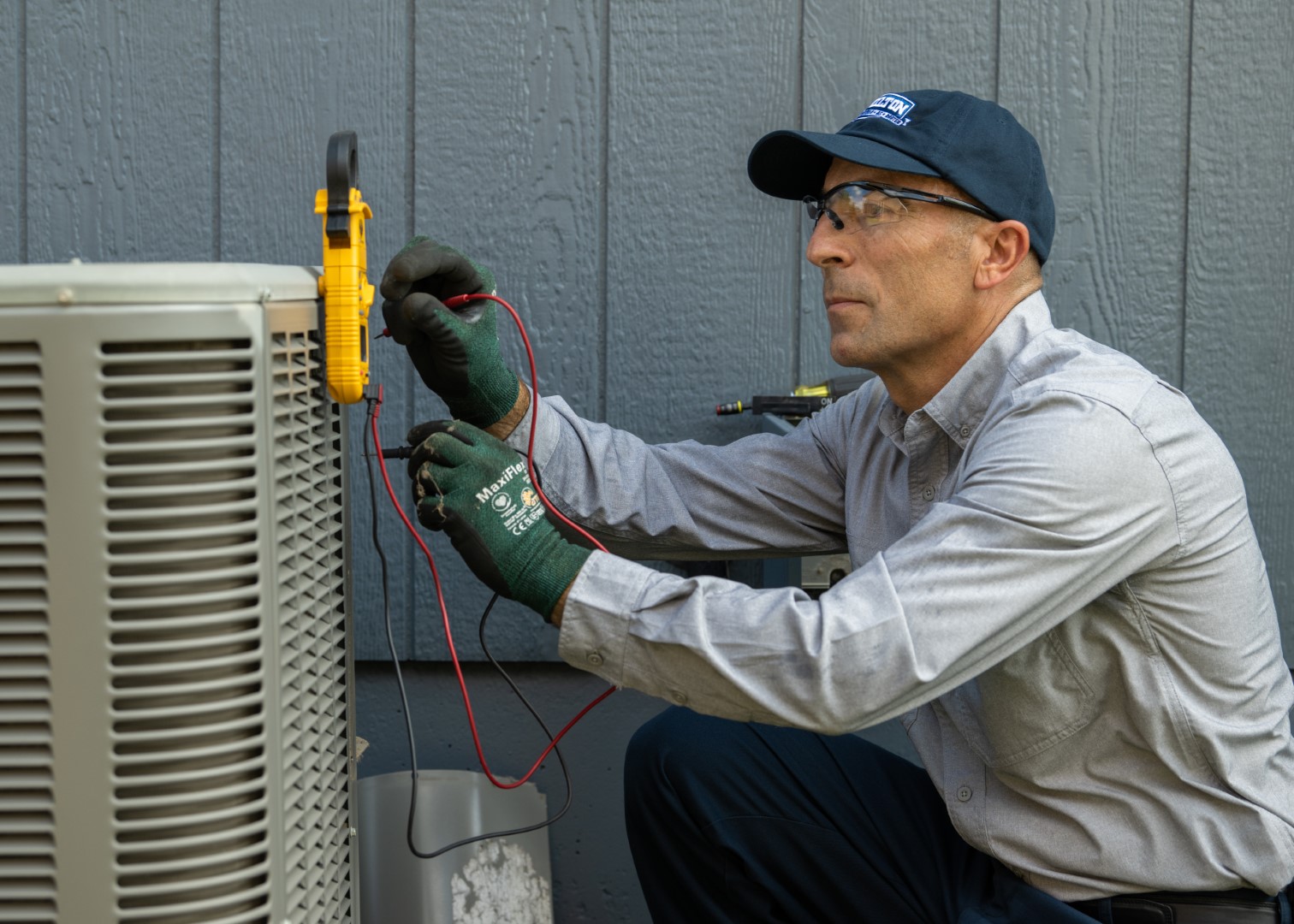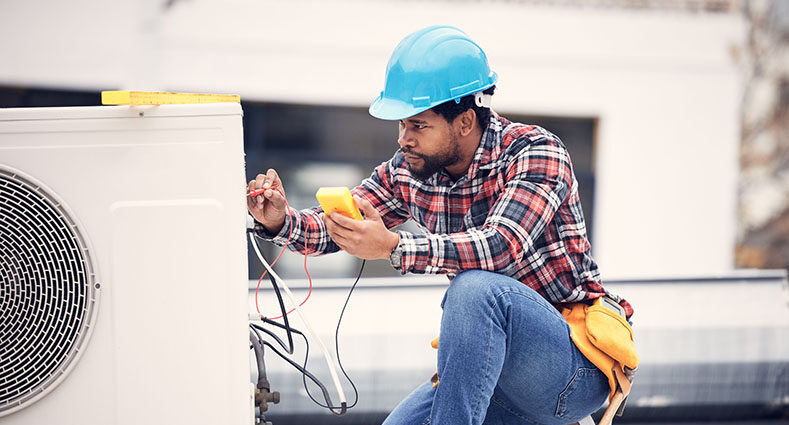The Relevance of Cooling And Heating Expertise: Uncovering Causes of Air Conditioning Issues for Home Owners
Home owners typically overlook the importance of understanding their a/c systems. Acknowledging common indications of a/c issues can result in prompt treatments. Problems like not enough air conditioning or uncommon noises are not just inconveniences; they can indicate much deeper worries. By checking out the source of these issues, home owners can enhance system performance and expand its life expectancy. What are the most prevalent concerns that can develop, and how can they be successfully attended to?
Typical Indications of Air Conditioner Troubles
Exactly how can home owners determine problems with their a/c systems before they rise? Recognizing usual indications of air conditioning troubles is crucial for prompt maintenance. One prevalent indication wants air conditioning; if the cooling system fails to reduce the indoor temperature level, it may indicate underlying concerns. Unusual noises, such as grinding or hissing, can also show mechanical failures or loosened components - ac unit replacement. Furthermore, homeowners must watch out for unusual smells originating from the device, which might suggest mold and mildew development or electric troubles. Frequent cycling on and off, referred to as brief cycling, can suggest thermostat problems or refrigerant leaks. A rise in energy expenses without an equivalent surge in usage may direct to ineffectiveness. By staying sharp to these caution signs, property owners can stop a lot more considerable problems and costly repair services, guaranteeing their cooling systems operate effectively throughout the warmer months

Understanding Cooling Agent Issues
Refrigerant problems can substantially impact the effectiveness of a HVAC system. House owners should know the signs of reduced refrigerant levels and the value of discovering refrigerant leaks. Attending to these troubles promptly can prevent additional damage to the system and guarantee top cooling down efficiency.
Reduced Cooling Agent Levels
An usual problem that property owners might come across with their HVAC systems is reduced refrigerant levels, which can greatly impact the system's effectiveness and performance. Refrigerant is important for the cooling procedure, taking in warm from indoor air and launching it outside. When levels drop, the a/c system battles to cool down the space effectively, bring about boosted power consumption and prospective system stress. Signs and symptoms of low refrigerant consist of inadequate air conditioning, longer run times, and ice development on the evaporator coils. House owners might additionally see uncommon sounds as the compressor functions harder to make up for the shortage. It is very important for homeowners to recognize the importance of keeping proper cooling agent degrees to ensure peak cooling and heating efficiency and longevity.
Refrigerant Leaks Detection
Where might a home owner begin when confronted with the opportunity of cooling agent leaks in their heating and cooling system? The initial step entails monitoring the system's efficiency. Indications such as decreased cooling down effectiveness, ice formation on coils, or hissing audios may indicate a refrigerant leakage. Home owners need to also look for visible indicators of oil deposit, usually an indication of a leakage. Making use of a cooling agent leak detector can give even more accurate recognition. If suspicions persist, consulting a qualified heating and cooling technician is vital, as they possess the expertise and equipment to find leaks successfully. Trigger discovery and fixing of cooling agent leakages not only improve system effectiveness yet additionally prevent prospective ecological harm, making it a necessary facet of cooling and heating maintenance.
Electrical Failures and Their Impact
Electric failures can greatly impact a/c systems, particularly via concerns like breaker breakdowns and defective electrical wiring. These troubles not only interrupt the system's performance but can likewise cause costly repair services and safety risks. Comprehending the implications of such failings is essential for homeowners to keep an effective and risk-free heating and cooling environment.
Circuit Breaker Issues
Just how can circuit breaker concerns impact the effectiveness of a HVAC system? Circuit breakers act as crucial safety and security tools that manage electric circulation to a/c systems. If a circuit breaker trips regularly, it interrupts power supply, leading to inconsistent heating or air conditioning. This can cause significant pressure on the system, causing inefficient operation and prospective damage to components. Property owners may see increased energy costs due to the heating and cooling system's battle to preserve wanted temperature levels. Additionally, repeated interruptions from tripped breakers can reduce the life-span of the a/c unit, calling for expensive fixings or replacements. Regular upkeep of breaker is important, as it ensures a stable power supply, ultimately improving the general efficiency of the HVAC system.
Faulty Wiring Effects
Regularly forgotten, malfunctioning electrical wiring can have dire consequences for HVAC systems. Electrical wiring problems may lead to short circuits, causing frequent malfunctions and raised repair work costs. Furthermore, improper electrical wiring can create inefficient power usage, resulting in greater utility bills and strain on the system. In severe instances, malfunctioning electrical wiring can set off electric fires, posing a considerable safety threat to homeowners. These electrical failings can harm A/c components, resulting in pricey substitutes or extensive fixings. Homeowners must focus on routine examinations by qualified specialists to identify and remedy circuitry issues prior to they rise. Recognizing the ramifications of defective circuitry can help guarantee the long life and safety of HVAC systems, ultimately safeguarding both the home and its passengers.
Clogged Filters and Their Consequences
While several homeowners may overlook the significance of routine filter upkeep, blocked filters can result in considerable repercussions for a/c systems. When filters become blocked with dirt, dirt, and particles, air flow is limited. This reduction in airflow forces the system to work harder, leading to enhanced power consumption and possibly higher utility expenses. With time, this stress can create damage on elements, resulting in early system failing.
In addition, blocked filters can endanger interior air top quality. Toxins and allergens may distribute throughout the home, exacerbating respiratory concerns and allergies for occupants. Poor airflow can trigger the evaporator coil to freeze, leading to pricey repair services and ineffective cooling performance. Frequently transforming or cleansing filters is a simple yet crucial maintenance task that can help guarantee the longevity and effectiveness of a/c systems, ultimately profiting both the home owner's comfort and their funds.

Thermostat Malfunctions Described
What happens when a thermostat breakdowns can considerably influence both comfort and energy performance in a home (HVAC contractor). A faulty thermostat may stop working to precisely check out the temperature, check my source bring about overcooling or insufficient air conditioning. This disparity can create pain for passengers and cause higher power bills, as the cooling and heating system works harder than needed
Usual problems include dead batteries, which can provide digital thermostats defective, and loose circuitry that disrupts interaction between the thermostat and the heating and cooling device. Furthermore, obsolete or badly adjusted thermostats might not react properly to temperature changes, additionally exacerbating power ineffectiveness.
Home owners need to be cautious for signs of breakdown, such as irregular temperatures or unanticipated power costs. Regular checks and understanding of the thermostat's capability can aid determine troubles early, guaranteeing peak efficiency of the HVAC system. Dealing with thermostat problems promptly is important for keeping a comfy living setting and handling energy consumption successfully.
The Duty of Regular Maintenance
Routine maintenance plays a necessary role in guaranteeing the durability and effectiveness of HVAC systems. Home owners who prioritize regular checks can protect against minor issues from rising right More Bonuses into pricey repair work. Regular maintenance normally includes tasks such as cleaning filters, inspecting ductwork, and checking refrigerant levels. These activities assist keep suitable air movement and system efficiency, decreasing power intake.
Additionally, a properly maintained heating and cooling system operates more successfully, providing consistent convenience throughout the home. Regular tune-ups can additionally prolong the lifespan of the unit, causing considerable cost savings with time. Property owners are encouraged to arrange specialist assessments at the very least yearly to recognize prospective troubles early.
Furthermore, many makers need normal maintenance to promote service warranties, making this method not only beneficial but often needed. In general, comprehending the significance of regular upkeep empowers homeowners to secure their cooling and heating systems versus unanticipated failings and enhance their investment in home convenience.
Frequently Asked Concerns
Just How Can I Improve My A/c's Power Efficiency?
Improving an air conditioning's energy efficiency includes routine upkeep, cleaning or replacing filters, securing ductwork, making certain proper insulation, utilizing programmable thermostats, and scheduling specialist inspections to determine and fix prospective issues affecting performance.
What Is the Life expectancy of a Typical Cooling Unit?
A normal a/c system has a life-span of 15 to two decades, relying on upkeep, use, and environmental elements. Normal upkeep can greatly prolong its operational life and enhance total effectiveness.
When Should I Replace My A/c System?
An air conditioning system must typically be changed every 10 to 15 years. Indicators for replacement consist of constant repair services, increasing power expenses, and insufficient air conditioning, indicating that an upgrade may be a lot more cost-efficient and reliable.
Can I Troubleshoot Air Conditioning Issues Myself?
Yes, individuals can troubleshoot a/c troubles themselves by checking filters, guaranteeing power supply, and checking for visible problems (Fix broken Air conditioner). However, complex issues frequently call for expert support for accurate medical diagnosis and secure repair service, making sure perfect system efficiency
Just how Do I Pick a Trustworthy HVAC Specialist?

To select a trusted a/c specialist, one must seek suggestions, examine online reviews, validate licenses and insurance coverage, page examine experience, and request in-depth price quotes to ensure top quality solution and reasonable rates before making a choice.
Verdict
To sum up, a solid understanding of cooling and heating systems enables property owners to successfully identify and attend to usual a/c issues. Recognizing indications such as insufficient cooling or climbing energy prices enables prompt treatments, which can substantially improve system effectiveness and long life. By remaining informed regarding prospective troubles like cooling agent leakages, electrical failures, and blocked filters, home owners can take proactive procedures to preserve their systems, ultimately making sure convenience and advertising a much healthier living atmosphere. Regular maintenance continues to be key to this undertaking.